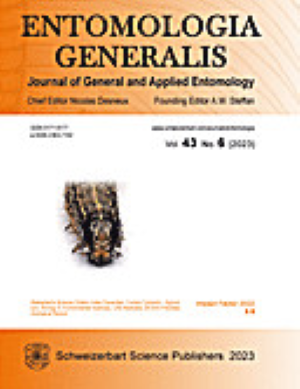Landscape structure and composition affect aphid biological control in alfalfa fields, but regional differences prevail
IF 4.6
1区 农林科学
Q1 ENTOMOLOGY
引用次数: 0
Abstract
Understanding how landscape composition and configuration drive the dynamics of pests and their various natural enemies is crucial to enhance biological control services (biocontrol). Geographic variability in landscape effects prompts questions about whether this is due to genuine differences or methodological differences among studies, given that most studies are conducted in a single region. This study investigated how the ecological function of parasitoids and predators responds to landscape traits in three regions encompassing an agriculture intensification gradient. The effects of landscape structure and configuration differed among regions and natural enemies. Non-crop habitats increased the abundance of parasitoids only in two less intensified regions presumably due to insufficient amount of non-crop habitats in the intensified region (typically < 10%). Nevertheless, their biological control efficiency (BCE) was consistently increased by non-crop habitats across regions. Higher maize proportion increased predator abundance and their BCE in the two non-mountainous regions. The value of maize as a source habitat for predators may have been limited in the mountainous region due to the lower aphid abundances there. Edge density positively affected abundances of predators and parasitoids, but only positively increased the BCE of all natural enemies combined. Inconsistent regional responses to the same landscape variables suggest that a uniform integrated pest management strategy for alfalfa is impractical. However, increasing edge density should be a useful first step for supporting diverse natural enemy communities and their biocontrol potential.景观结构和组成会影响紫花苜蓿田中的蚜虫生物防治,但地区差异普遍存在
了解景观组成和配置如何驱动害虫及其各种天敌的动态变化,对于加强生物防治服务(生物控制)至关重要。由于大多数研究都是在单一地区进行的,因此景观效应的地域差异性引发了这样的问题:这是由于真正的差异还是由于研究方法的差异。本研究调查了寄生虫和捕食者的生态功能如何对三个地区的景观特征做出反应,这三个地区包含了一个农业集约化梯度。景观结构和配置对不同地区和不同天敌的影响各不相同。只有在两个农业密集度较低的地区,非作物栖息地才会增加寄生虫的数量,这可能是由于在农业密集度较高的地区,非作物栖息地的数量不足(通常为 10%)。尽管如此,非作物栖息地在各地区始终提高了寄生虫的生物防治效率(BCE)。在两个非山区,玉米比例越高,捕食者的丰度和生物控制效率就越高。在山区,由于蚜虫丰度较低,玉米作为捕食者源生境的价值可能有限。边缘密度对捕食者和寄生虫的丰度有积极影响,但对所有天敌的综合 BCE 只有积极影响。各地区对相同景观变量的反应不一致,这表明统一的紫花苜蓿害虫综合治理战略不切实际。不过,增加边缘密度应该是支持多样化天敌群落及其生物防治潜力的有用的第一步。
本文章由计算机程序翻译,如有差异,请以英文原文为准。
求助全文
约1分钟内获得全文
求助全文
来源期刊

Entomologia Generalis
生物-昆虫学
CiteScore
7.10
自引率
18.80%
发文量
72
审稿时长
>12 weeks
期刊介绍:
Its scope covers all aspects of basic and applied research dealing with insects and more broadly with arthropods inhabiting wild, agricultural and/or urban habitats. The journal also considers research integrating various disciplines and issues within the broad field of entomology and ecology.
Entomologia Generalis publishes high quality research articles on advances in knowledge on the ecology and biology of arthropods, as well as on their importance for key ecosystems services, e.g. as biological control and pollination. The journal devotes special attention to contributions providing significant advances (i) on the fundamental knowledge and on sustainable control strategies of arthropod pests (including of stored products) and vectors of diseases, (ii) on the biology and ecology of beneficial arthropods, (iii) on the spread and impact of invasive pests, and (iv) on potential side effects of pest management methods.
Entomologia Generalis welcomes review articles on significant developments in the field of entomology. These are usually invited by the editorial board, but proposals may be sent to the Editor-in-Chief for preliminary assessment by the editorial board before formal submission to the journal. The journal also considers comments on papers published in Entomologia Generalis, as well as short notes on topics that are of broader interest.
 求助内容:
求助内容: 应助结果提醒方式:
应助结果提醒方式:


